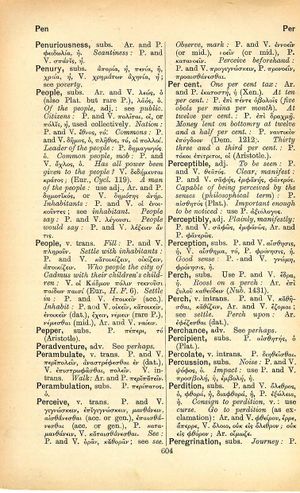people: Difference between revisions
(Woodhouse 4) |
(CSV4) |
||
| Line 1: | Line 1: | ||
{{ | {{Woodhouse1 | ||
| | |Text=[[File:woodhouse_604.jpg|thumb|link={{filepath:woodhouse_604.jpg}}]]'''subs.''' | ||
Ar. and V. [[λεώς]], ὁ (also Plat. but rare P.), [[λαός]], ὁ. | |||
<b class="b2">Of the people</b>, adj.: see [[public]]. | |||
<b class="b2">Citizens</b>: P. and V. πολῖται, οἱ, or [[πόλις]], ἡ, <b class="b2">used collectively.</b> | |||
<b class="b2">Nation</b>: P. and V. [[ἔθνος]], τό. | |||
<b class="b2">Commons</b>: P. and V. [[δῆμος]], ὁ, [[πλῆθος]], τό, οἱ πολλοί. | |||
<b class="b2">Leader of the people</b>: P. [[δημαγωγός]], ὁ. | |||
<b class="b2">Common people, mob</b>: P. and V. [[ὄχλος]], ὁ. | |||
<b class="b2">Has all power been given to the people?</b> V. δεδήμευται [[κράτος]]; (Eur., ''Cycl.'' 119). | |||
<b class="b2">A man of the people</b>: use adj., Ar. and P. [[δημοτικός]], or V. [[δημότης]] [[ἀνήρ]]. | |||
<b class="b2">Inhabitants</b>: P. and V. οἱ ἐνοικοῦντες; see [[inhabitant]]. | |||
<b class="b2">People say</b>: P. and V. λέγουσι. | |||
<b class="b2">People would say</b>: P. and V. λέξειεν ἄν τις. | |||
'''v. trans.''' | |||
<b class="b2">Fill</b>: P. and V. πληροῦν. | |||
<b class="b2">Settle with inhabitants</b>: P. and V. κατοικίζειν, οἰκίζειν, ἀποικίζειν. | |||
<b class="b2">Who people the city of Cadmus with their children's children</b>: V. οἱ Κάδμου πόλιν τεκνοῦσι παίδων παισί (Eur., ''H.F. 6''). | |||
<b class="b2">Settle in</b>: P. and V. ἐποικεῖν (acc.). | |||
<b class="b2">Inhabit</b>: P. and V. οἰκεῖν, κατοικεῖν, ἐνοικεῖν (dat.), ἔχειν, νέμειν (rare P.), νέμεσθαι (mid.), Ar. and V. ναίειν. | |||
}} | }} | ||
Revision as of 09:48, 21 July 2017
English > Greek (Woodhouse)
subs.
Ar. and V. λεώς, ὁ (also Plat. but rare P.), λαός, ὁ. Of the people, adj.: see public. Citizens: P. and V. πολῖται, οἱ, or πόλις, ἡ, used collectively. Nation: P. and V. ἔθνος, τό. Commons: P. and V. δῆμος, ὁ, πλῆθος, τό, οἱ πολλοί. Leader of the people: P. δημαγωγός, ὁ. Common people, mob: P. and V. ὄχλος, ὁ. Has all power been given to the people? V. δεδήμευται κράτος; (Eur., Cycl. 119). A man of the people: use adj., Ar. and P. δημοτικός, or V. δημότης ἀνήρ. Inhabitants: P. and V. οἱ ἐνοικοῦντες; see inhabitant. People say: P. and V. λέγουσι. People would say: P. and V. λέξειεν ἄν τις. v. trans. Fill: P. and V. πληροῦν. Settle with inhabitants: P. and V. κατοικίζειν, οἰκίζειν, ἀποικίζειν. Who people the city of Cadmus with their children's children: V. οἱ Κάδμου πόλιν τεκνοῦσι παίδων παισί (Eur., H.F. 6). Settle in: P. and V. ἐποικεῖν (acc.). Inhabit: P. and V. οἰκεῖν, κατοικεῖν, ἐνοικεῖν (dat.), ἔχειν, νέμειν (rare P.), νέμεσθαι (mid.), Ar. and V. ναίειν.

